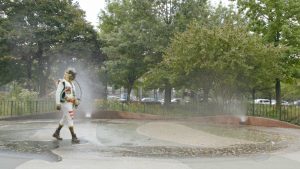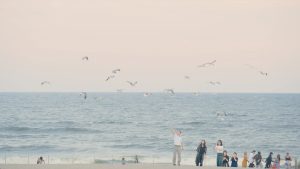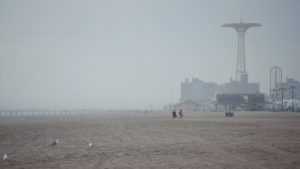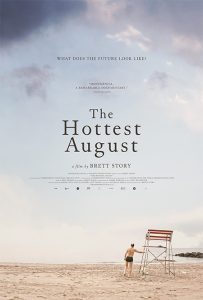“The Hottest August” (2019). Cast: Clare Coulter (narrator). Director: Brett Story. Web site. Trailer.
What does the future hold? That’s a question many of us ask ourselves often, both individually and collectively. But how wide a view do we take when answering it, again, either individually or collectively? That’s a subject addressed in the experimental new documentary, “The Hottest August.”
It probably doesn’t come as much of a surprise that, when we contemplate the future, we usually do so in terms of how it most directly affects us as individuals or in our peer groups. We think about our homes, our families, our communities, our professions and so forth, the aspects of our lives that have the most immediate impact. We consider what lies ahead for each of these areas of our lives and speculate what shapes they might take and what qualities they could possess. And that’s not unexpected; after all, all of us have a vested stake in the outcome.
But how often do we ponder the future of areas outside of our immediate field of impact? A communications worker, for example, might ruminate about the future of his or her industry and the technology associated with it, but how readily would said professional think about global economics or the state of the environment? How likely is a low-income laborer to examine the effect that the prices of commodities futures have on the portfolios of the one-percenters? Does the extinction of an insect species in Africa affect the lives of Midwestern housewives?
Some of these questions may seem silly, perhaps even absurd. However, if we live in a truly interconnected reality, such queries may be more relevant than initially meets the eye. For instance, who would have thought that a hurricane in Florida could lead to the collapse of a publishing venture in Chicago and the layoff of its staff (a scenario I can speak to personally)? Thus, examining our world and its future from a holistic standpoint is more important than many of us might believe.
[caption id="attachment_11329" align="aligncenter" width="350"] Are environmental suits in our future? That’s one of the questions raised in the experimental new documentary, “The Hottest August.” Photo courtesy of Grasshopper Film.[/caption]
Are environmental suits in our future? That’s one of the questions raised in the experimental new documentary, “The Hottest August.” Photo courtesy of Grasshopper Film.[/caption]
In “The Hottest August,” director Brett Story attempts to do this in a way that probably hasn’t been tried before. Through interviews with everyday individuals in the greater New York City area, representing all ages, races, and cultural, economic and social backgrounds, he asks them what they foresee for the future, be it on the macro level or personally. And their responses are quite revealing in terms of how they view the world, its challenges and their place in it all.
Since the world is an interconnected place, as the film contends, the challenges it faces realistically can’t be looked at in a vacuum; they need to be addressed from an integrated perspective. Yet, based on the answers of the interviewees, it’s quite telling how many of them view the world from such tightly focused, single-minded outlooks. Their answers reflect the concerns that impact them the most, with minimal to modest consideration for what’s outside their immediate existence, such matters essentially being treated as if they’re on the “periphery” of their lives (when, in fact, they’re just as much a part of their reality as the elements that affect them most directly, even if not as much or as often).
This is not to suggest short-sightedness or closed minds on their part; it merely demonstrates how many of these individuals have allowed themselves to become accustomed to thinking along those lines. They may not be unconcerned about the aspects of their existence that are outside of their immediate purview; rather, this is more likely a case of them just having never given them much thought, simply because of the way they think (and how they were taught to do so). However, given the issues the world is facing today, such a limited view can’t be allowed to continue. A more inclusive outlook must be put into place – and, as the occupants of this reality, that has to start with us.
Since existence is not something that we deal with on a compartmentalized basis, we shouldn’t expect that we can solve its problems using such an approach. Given that all of the components of reality are inherently intermingled, we must thus employ an integrated approach to solving their problems. The environment, for example, cannot be remedied without considering the economics involved, which, in turn, may affect consumer product development, which, in turn, may affect everyday lifestyle choices…and so on, and so on, and so on.
[caption id="attachment_11330" align="aligncenter" width="350"] Will the wildlife we know today still be around tomorrow? Filmmaker Brett story asks that in the experimental new documentary, “The Hottest August.” Photo courtesy of Grasshopper Film.[/caption]
Will the wildlife we know today still be around tomorrow? Filmmaker Brett story asks that in the experimental new documentary, “The Hottest August.” Photo courtesy of Grasshopper Film.[/caption]
But how do we go about this? It has to do with our beliefs, for they shape the reality we experience through the conscious creation process, the philosophy that maintains we draw upon them in manifesting our existence. In this case, however, it requires us to take a broader view than we typically have when it comes to the development of our beliefs. For instance, from this perspective, to build a better mousetrap, we must go beyond merely devising beliefs for coming up with the schematics. We must instead formulate beliefs that consider the need for such a device, the materials from which it’s constructed, the economics behind its production, and the impact on the environment, the mice and our relationship to them. In short, this calls for us to look at how we form manifesting beliefs from the standpoint of the overall bigger picture of our existence. And that’s essentially what this film is all about.
In many regards, this picture is aimed at showing us how to shift our thinking in the formation of one of our “core beliefs,” one upon which all others rest. Think of this as the metaphysical equivalent of a computer operating system, one upon which all of the “application program” beliefs run. In essence, making this shift calls for a whole new way of developing the beliefs that emerge from this underlying template. Such an approach pushes us to devise new manifestations based on beliefs that incorporate the principles of the core notion automatically, qualities that are built in up front so that they’re taken as givens from the outset. Beliefs that don’t take such considerations into account from the very beginning simply don’t gain any traction – nor do they have a realistic chance of even coming into being.
This new way of thinking may take some time to become accepted and put into use. However, once we begin doing so routinely, we may well look back and wonder why we weren’t employing this practice all along. One of the hardest parts in this, though, is making individuals and communities aware of this principle and encouraging them to put it into use on a regular basis. Again, that’s what this film attempts to show us. It exposes us to many of the components we need to consider and subtly nudges us in the direction of looking for ways to integrate them with one another through a holistic, inclusive approach.
Since we’re new at this, we probably shouldn’t expect overnight success. But at least taking those very first baby steps is a move in the right direction. The more confident we grow at this, the more this will seem like second nature, something that will likely be reflected in the results we experience. And, like a muscle that grows stronger with greater use, so, too, will our proficiency in this approach to the conscious creation process. The pieces will start to fall into place more readily and transform the nature of the elements of the reality we experience.
Or at least that’s what we like to hope for. We could just as easily stay myopic and continue to plunge headlong deeper into the problems we’re experiencing, depending on what beliefs and outlooks we embrace. That’s a potentially scary prospect, and it’s one that’s raised in the course of the film. Will we heed the warning?
[caption id="attachment_11331" align="aligncenter" width="350"] What kind of climate does the future hold, and how will it impact activities we take for granted? Such integrated questions are among those raised in the experimental new documentary, “The Hottest August.” Photo courtesy of Grasshopper Film.[/caption]
What kind of climate does the future hold, and how will it impact activities we take for granted? Such integrated questions are among those raised in the experimental new documentary, “The Hottest August.” Photo courtesy of Grasshopper Film.[/caption]
On the other hand, the film shows us examples of individuals who are beginning to move in the direction of taking a wider view. We can hope that their perspectives catch fire and that others follow their lead. That’s the other side of the coin – and the one that we should hope flips in our favor.
Depicting both perspectives shows us where we’re at as a species. And that’s one of the other aims of this film. By presenting us with a cinematic view of the world in one locale (greater New York) during one particular period (the month of August 2017), we get to see the kaleidoscopic panorama of our existence and its many components – as well as the many resources we have available to us to draw upon in shaping our existence as we move forward. The question is, what will we choose?
No matter how we ultimately proceed, we’ve got to start somewhere, and “The Hottest August” presents us with a poetic and inclusive illustration of this idea. It doesn’t tell us what to do, but it certainly shows us by way of example what we can do if we put our minds to it. The question here, of course, is “Are we astute enough to recognize the message being sent our way?” I’d like to believe the director thinks so (or at least hopes so), an aspiration to which I’d heartily lend my support and encouragement as well.
In the meantime, the film reminds us, we all have to remember to live our lives. We may have ongoing challenges to address, but we also have the daily aspects of everyday living to contend with, the things that sustain us, give us joy and provide us with meaning for living. We mustn’t lose sight of those activities as we tackle the bigger questions, as they’re part of what makes life and the human experience worth living. It’s a lot to take in, to be sure, but then that comes with the territory as we examine and assess the bigger picture of our existence.
While the tone of “The Hottest August” is decidedly experimental and the narrative definitely defies categorization, this unconventional documentary attempts to provide an integrated look at our existence, one that seeks to reconcile our present with what could be our future at a time that’s a crucial crossroad of change on many fronts – socially, politically, economically and environmentally, to name a few – and the impact of that amalgamation of influences on everyday individuals, both personally and collectively. By combining impromptu, unscripted interviews with everyday Gothamites and footage of ordinary daily events and happenings of global significance (most notably the August 2017 solar eclipse), director Brett Story attempts to assemble a holistic package that illustrates the interconnectedness of all these elements and how to deal with them, both now and down the road, a tall order for sure. While the film is not entirely successful at its task (it’s sometimes a bit too random and meandering in its approach), the filmmaker’s obviously sincere attempt to show how the coalescence of these many factors influence us as individuals and as a species is nevertheless commendable, achieving something that other directors have sought to attain but not nearly as effectively or poetically as is the case here. Check the film’s web site for screenings.
“The Hottest August” is indeed an important film, one to be admired on multiple levels and one that’s capable of both inspiring and terrifying us at the same time. Indeed, if ever there were a film that shows how we’re experiencing the ancient Chinese proverb of “living in interesting times,” this would be it. May our wisdom be up to the challenge.
Copyright © 2020, by Brent Marchant. All rights reserved.
Tuesday, February 25, 2020
‘The Hottest August’ showcases how to survey the bigger picture
Subscribe to:
Post Comments (Atom)

No comments:
Post a Comment